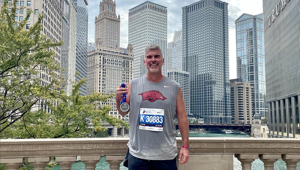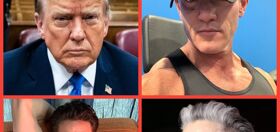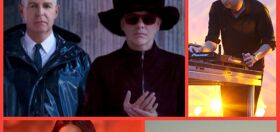
John Cameron Mitchell’s new musical narrative podcast, Anthem: Homunculus, is stacked with an incredible group of artists, Glenn Close, Patti LuPone, Laurie Anderson, Nakhane, Ben Foster, Cynthia Erivo, Marion Cotillard, Denis O’Hare, Justin Vivian Bond and Bridget Everett among them.
It’s easy to see why so many talented folks are eager to work with Mitchell, who in addition to creating and starring in Hedwig and the Angry Inch, has directed unique and soulful films like Shortbus, Rabbit Hole, and How to Talk to Girls at Parties.
The new podcast, with music by Bryan Weller, is an audible journey into the soul, and the enveloping sound effects and editing let you fully immerse yourself in Mitchell’s intimate poetry of song and spoken word which weaves together like a quilt. You know those quilts that bend the space-time continuum? One of those. Tip: Listen to it on good speakers.
Anthem is available now across all podcast streaming platforms. We scored some time to talk with Mitchell about the project and life in general.
How about we take this to the next level?
Our newsletter is like a refreshing cocktail (or mocktail) of LGBTQ+ entertainment and pop culture, served up with a side of eye-candy.
——–
I want to start by asking you something very concrete. Did you see the picture of the black hole?
I did. It looked like my Grindr profile pic.
The New York Times called it a “smoke ring framing a one-way portal to infinity” and the Harvard astronomer they spoke to said, “we have seen what we thought was unseeable.” So with that in mind, how will we be able to see your new podcast?
[Laughs] Well I actually believe it’s healthier for the mind to have some senses not stimulated, to experience one or two rather than all of them. In life we experience all, in film we experience hearing and visual, in cuisine we have taste. In our case, having one sense, hearing, which is, perhaps, next to vision, the most complex, allows the other senses to stimulate, to use the imagination.
Definitely.
I use the example of porn. Every guy used to whack off, you know, usually before they go to bed, without a visual. And you used the mind’s eye, right? You create a story. It’s storytime. And the things you come up with are quite interesting– everyone is a genius when you’re masturbating. Formulaic porn has kind of shut off that avenue of expression, and podcasts are opening up another one.
[Laughs] Excellent segue. And yeah, it took me a few episodes of Anthem for my brain to get accustomed to the storytelling. I’ve never really listened to what’s essentially a radio drama.
Yeah, and it really is an acquired taste. But then so is reading. And they’re the same. You’re imagining the vision in your mind and you’re taking it in through words — in this case, words with sounds and music — and the rest of it you’re inventing in your head. And that, I think, is a very healthy way that is perhaps more respectful of the listener, as opposed to the people who sort of want everything cut and dried. In our case, yes, we’re using an old form, we’re trying to make it new by telling this particular story with this music and these actors who are used to other forms, and it takes a few– How many episodes have you listened to?
I just finished the last one this morning.
OK well, you can see it’s quite a journey.

Yes, it is. There was a bit of resistance at first, thinking “I can’t follow this” or “I can’t sit here and stare at the wall. Do I open my eyes? Do I close my eyes?” And that was gone by episode three, and then I would just be hitting next and devouring them. It was really fun.
It’s interesting — the first episodes of any series is a lot of exposition and so the action doesn’t always kick in, and in our case, we have this strange template of firsts where you’re in the present and then you’re in this hallucination and then all hell breaks loose when we meet Jairo [played by the buttery-voiced artist Nakhane], which is in some ways the most important storyline, Jairo and Joan. And if I reduced it to a feature film it would probably focus on them. So yes, it’s going to be something that’s acquired, something you need to train yourself a little bit to pay attention, to settle. Good sound helps, you can’t half-ass the sound.
I definitely heard it all.
Good. We took a long time to do that, and it took money. We had mixers that work in film and television bringing their skills to it, and that was a thrill. It just made it more difficult because we were biting off a lot, and you know. I really encourage people to give it three episodes before you make any decisions.
Yeah, that’s right when it clicked for me.
And there are so many great people in it. The soundtrack, of course, will be very important. We’re going to have a 30-song soundtrack and eventually a three-record vinyl.
That’ll be very exciting.
Something like this, let’s just say, you don’t get a lot of suitors. When I first wrote it, it was a TV series and I pitched it like a regular series in LA. All the HBOs and Amazons and Netflixes very respectfully declined, because they couldn’t see it. They didn’t know what genre it was. And I was kind of disappointed, but not that surprised, because if I had brought Hedwig to them today, if they’d never seen it, it would have been the same thing. “I can’t see it, I can’t categorize it, so I can’t risk this kind of money.” We went to podcast as a consolation prize, but now in retrospect, I’m so much happier that we did it this way because we could control it, we could get weird, we had a great budget from our wonderful financiers to really make it right, all the actors were thrilled because they’re off doing their money job and this is like, the fun one.
And I can imagine when you’re working with Glenn Close and Patti LuPone, scheduling becomes a “thing.”
It does. But they’re theater people, they’re up for it. They know how it works. Marion Cotillard played my doctor, and we recorded her on the phone in France. And to fix lines, I would say, “Glenn girl, where are you? Montana? Could you put a towel over your head, record a line into your iPhone and text it to me?” And then I would drop it in the mix. So it’s so much easier than a reshoot and you can say, “Patti, you don’t have to shave! Just bring your slippers.”
[Laughs] So to back up just a little bit, the full title of the series is Anthem: Homunculus. Can you explain what a “homunculus” is?
Homunculus is a word I always loved that I imagine someone imperious like Glenda Jackson employing to take down some idiot in Parliament, because it means “little man.”
And the Homunculus in this story comes in the form of a brain tumor growing inside of Ceann, your character’s, head. Hope that’s not a spoiler.
Yes and homunculus is also the name of a kind of tumor, a fetiform teratoma, is the more technical term.
Ah, interesting. And I know back when you were considering a Hedwig and the Angry Inch sequel, the idea you were working with involved Hedwig becoming pregnant with a tumor. So we’re all dying to know, what it is about an autonomous tumor that rang so loudly for you?
As a kid, I was always obsessed with twins, and of course, Hedwig has that “other half” thing, and I also like weird body things. I love figurative art when people will really distend the body or do something surreal with the body. So the metaphorical idea of a person inside you was so strong. Some would say it’s an undeveloped twin, others would say it’s a clone. A friend got a growth removed and it had hair and teeth.
It’s aliiiive!
It’s alive! As a kid there was this movie called It’s Alive, and I never saw it but I was obsessed with the commercial because it was like, a baby cradle with tinkling sounds and the announcer was like, “There’s only one thing wrong with the Jones’ new baby,” and then a tentacle would come out of the cradle and he’d say, “It’s alive!” I love body horror, and in this case, I found it could be a great metaphor for guilt. I’m not the kind of person who says, “You made yourself sick,” though I think there’s some truth in that, but there is something about unexamined grief and guilt that can hurt you.
It lingers in the body.
Yeah, and I don’t think it gives you cancer by any means, it’s far too complex for that, but in this case, something is growing within [Ceann] that is almost like a neglected part of himself. It’s almost like the part of himself he hasn’t thought about, his own grief and guilt about his boyfriend [Jairo], and this whole piece came out of me dealing with the death of my boyfriend Jack, from addiction, in 2004. He was in Cheater, which was [Hedwig composer] Stephen Trask’s band, and he was in Squeezebox Band, and he taught me a lot about life, and his loss shattered something in me, and this is in some ways trying to heal that. So the character Jairo, in this case, is a biracial South African, but many of his attributes are Jack. And Glenn Close is playing a version of my mom. Denis O’Hare is a version of my military dad. Patti LuPone is a version of my aunt who was a nun.

I did pick up on some of these autobiographical touch points, including the setting itself. The story takes place in the same fictional trailer park in Junction City, Kansas, and in the same very trailer, that Hedwig lived in. And that’s also a part of you as an artist.
Exactly. And it’s obliquely mentioned, but that’s part of me, too. And it’s also in the style of Hedwig, you could say that it’s in the same genre, right? It’s kind of a rock musical where you talk to the audience.
And what was it about that specific location that made you want to revisit it?
Well even though I’ve lived around the world, Junction City is where I kind of became a person. I pubesced there. I think you remember that time the most. And the character who plays my ex-girlfriend in high school is based on my real ex-girlfriend and the character that is the kind of nonbinary person in Hawaii was based on someone I met. I don’t quite understand it all, but at a certain point in your life you go back and look at those things. I thought, “Why not put myself in the trailer park where Hedwig lived?” because in a way I still live there, psychically. The whole process is healing for me, I’m trying to understand where I came from and where loss can be a part of life, and also imagine the worst, you know? What if I hadn’t left that small town? Who am I if I’m not my work? Also this certain rage about America is in there right now, in terms of crowdfunding your survival and being trapped by digital ADD and technology and lack of empathy and a polarized electorate and many depressed young people thinking it’s all downhill.
So much of Anthem deals with reconciling with the past and facing the past in its entirety, something I and surely many people find themselves grappling with. There were so many lines I wanted to write down, not even for this interview but just to keep around me. One, in particular, was “I gaze into the future, where my heart has the right to remain unbroken.” It got me thinking about what I’m clinging onto, what I need to release, but what are we clinging onto culturally that needs a collective release?
Well in our panic about the future, some people react by, “Oh, let’s close the borders and regain our former fake memory of happiness and die white together and keep the immigrants out because they’re causing all that is bad in the world.” We really have to let go of that fear and remind ourselves that we’re a nation of immigrants, for better or worse. You know? Some of the immigrants were horrible, some were great. Some of them killed the Indians and enslaved people and some of them created ideas of human rights and technology that has helped millions have a better life. I’m still patriotic in the Statue of Liberty way, that made me weep as a child, the idea of a place where you could go when you weren’t wanted anywhere else, but we would welcome you. That’s what we have to remember about where we are.
And that’s really part of the queer experience for many people, finding a place that welcomes you when you are unwelcome in the home you’re born into.
Yeah, creating new homes. It’s not a mistake that the Radical Faerie movement is about creating other, alternative homes and families, chosen families. In our ad, I say my character is examining his biological family and his logical family, which is an Armistead Maupin phrase. And in this strange time, when in the future we will all be anonymous for fifteen minutes, we’re all on stage, the one thing I think we can let go of — and I understand it came from a lot of grievances and a lot of abuse and a lot of unfairness and atrocity — is letting go of identifying yourself first as a victim. And that’s what Hedwig is about, she’s a bitter victim for the whole thing and then she lets go at the end, lets go of the drag and lets go of the labels and walks into the light, naked, and says, “Take me for what I am.” Which is not the same as “I can’t change.” Admitting your vulnerability is a kind of change, a healthy change. Right now we have a nation of victims and everyone feels like paranoid Ted Kaczynski-like shut-ins behind their screens, screaming at each other, or liking each other but not necessarily being in a room with one another. They are misunderstanding each other because they’re not looking at a face.
And like you bring up in Anthem, technology has played such an accelerating role in that, and there are so many downsides of this ever-growing online connectedness, but then what is the other side of that?
The other side is we can find people, although then the choice is actually daring to meet them, finding them is easy. But we get scared of even meeting up or even small talk because we don’t want to be vulnerable. Even sex has kind of been reduced by technology. Celibacy, it seems, is the new trend for young people. Because sex and life are messy.
I loved this moment during one of the sex scenes in Anthem between you and the America character because you crack a joke and you both start laughing, and it rang so true. That’s what good sex so often feels like, a deeply comical celebration.
Acknowledging the absurdity.
Yeah, these body parts flying around. Do you think sex has lost its sense of humor with hookup apps?
Mmhm. I still have some leftover Hedwig lines, like “I was disasturbating for days” and “I hit my bottom and he hit me back.” My other Grindr joke that’s in Anthem is, “Grindr had diminishing returns. I’d find myself driving 60 miles for a hatchback facial and half a blowjob.”
Do you use Grindr?
I do and I’ve met some really cool people. I feel like it requires so much. I’m an old school person, I’ll be like, “Let’s meet up. If it doesn’t work out, it doesn’t work out.” But people are curating their experiences now, so there’s panic about committing to the actual meeting. And I did sort of invent it in Shortbus. I had a pre-iPhone thing called “Yenta” which was perhaps the first GPS-based hookup device. It was sweeter than Grindr, it had a Dolly Levi-like animated matchmaker who said: “Have I got a match for you!”
Will we ever be able to stream Shortbus?
Well we do have the rights back, it’s just that the Netflixes and such aren’t buying old films anymore, and people aren’t really even watching new small films either, but the Hedwig blu-ray is coming out on Criterion in June, and we’re hoping Shortbus will, too, which means it will be streamable eventually.
When I last saw you, you were digging through old Hedwig photoshoots from her beginnings.
We’ve got lots of extras and deleted things and art with the Criterion release, and we’ll do the same for Shortbus.
And now you’re revisiting Hedwig with the Origin of Love Tour after an incredible Broadway run in 2015 — and I’m loving her new cubist wardrobe so much.
Yes, Erik Bergrin, genius. I call it the Hedwig transformer outfit because it’s 6 costumes in one.
It’s stunning. What’s it been like to pull that wig down from the shelf again?
It’s fun, doing the play was actually a little limiting, you get sort of bored with it. But this is, it’s almost like being Hedwig as opposed to telling the story of Hedwig. I act as myself in it, but I’m completely unbridled and uncensored. It’s more punk than anything I’ve ever done. I can say whatever I want; it’s what I’ve always dreamed of. As a Broadway guy, I always felt trapped by the words. And even when Hedwig went to Broadway, people would be mad when I sang something differently, but that’s the point of rock’n’roll, you go with what’s happening. And then I ripped my knee out during my Broadway Hedwig run, which was a great piece of luck because then I could come up with new stuff and say jokes like, “You’re seeing the show with the original cast.” I feel like I’m having more fun with Hedwig than I ever have, and I can tell the story of Jack and working with Stephen [Trask] and the Gnostic Christian gospels that inspired Tommy Gnosis.
What’s on tap for the second season of Anthem?
Each season will be a separate story with different writers and makers. We want season one to come out so people can see what it is before we seek out the next collaborators.
Well, I think people are going to love it.
——–
Watch the trailer below:
Anthem: Homunculus is produced by Topic and available on Luminary starting April 23.
Queerty’s managing editor Dan Tracer is a queer writer, noisemaker, and amateur astral projector. Find him on Instagram.




















Terrycloth
A male version of Jamie Lee Curtis
socaliscorpio
he is revolutionary! I still have never seen the Hedwig movie because I couldn’t find where to stream it. PS a place that only serves matcha!? I want that!